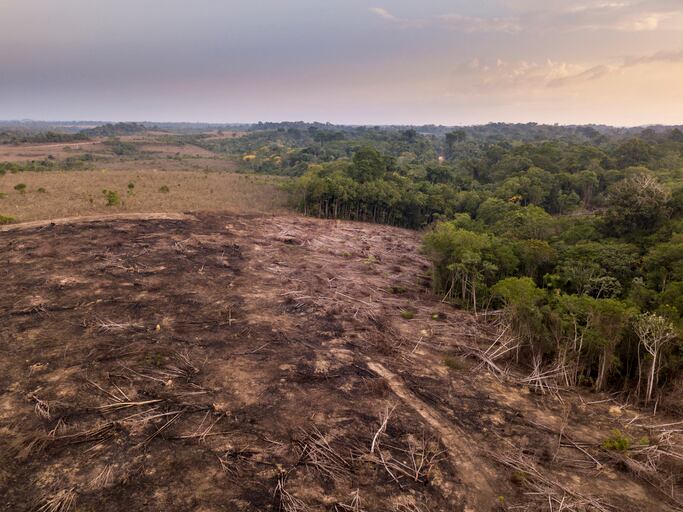Those organizations have released a report, From commitments to action at scale: critical steps to achieve deforestation free supply chains, which assesses company disclosures to understand how they are working to mitigate risks within their supply chain, using data from CDP’s 2021 forests questionnaire, which is aligned with the AFi’s core principles and the task force on climate-related financial disclosures (TCFD).
The publication includes disclosures from 675 companies that produce or source at least one of the seven commodities responsible for most commodity-related deforestation: timber products (491 companies disclosing), palm oil (233), cattle products (126), soy (154), rubber (51), cocoa (54) and coffee (27).
And the findings show that industry is well off track to meet the COP26 pledge to end deforestation by 2030, said CDP.
According to the data, only 36% of companies (245/675) have public company-wide no-deforestation or no-conversion policies and only 13% have commitments to no-deforestation/no-conversion that are well-aligned with good practice.
The majority of companies do not have sufficient traceability (77%) or monitoring systems (74%) throughout their supply chains to implement commitments made or assess progress against them.
Meanwhile, some 211 disclosing companies identified over US$79.2bn of forest-related risks; the cost of responding to identified risks was US$6.7bn.
Positive action
The publication did note that some firms are making some positive headway, though.
It shows 76% of companies (512) report having a traceability system for at least one commodity, two-thirds of companies (444) report that they are engaging with direct suppliers to manage and mitigate deforestation risks and half of all traders, while manufacturers or retailers (194/390) disclose that they are working with their indirect suppliers to manage and mitigate deforestation risks.
“Most companies disclosing on their commodity supply chains have started to put governance and operational systems in place to understand and mitigate deforestation and related risks. However, these systems currently lack the scale, scope and rigor necessary to effectively address deforestation and ecosystem conversion associated with agricultural and forest commodity production and trade,” cautioned CDP.
Theory of change
CDP’s forests questionnaire enables companies to clearly report on their progress to eliminate deforestation and manage deforestation risks, according to Thomas Maddox, global director, forests, CDP.
“Disclosure is the first step to driving change. The whole process is driven by what we call authorities, predominantly investors but also big buyer companies. They work with CDP to put out requests every year. They ask companies that are part of their portfolios or companies that they buy from to disclose through CDP. The results then go back to those authorities, and can inform their decision-making,” he told us on a call last week.
There is always a percentage of firms that don’t respond, said Maddox. “The requests from buyers, retailers such as Walmart, etc., seem to carry much more weight. That could be a reflection of investors still not taking deforestation as seriously as climate,” he continued.
The 675 entities covered in this year’s report represent 24% of the 1,902 companies called on to disclose through CDP by investors, and 67% of the 822 companies requested to do so by buyers. Reporting companies include 266 organizations based in Europe, 203 in the US and Canada, 196 in Asia, and 105 in South America.
The report is not focused on a naming and shaming approach. “It is all about shining the spotlight and letting that be the first step in driving action. Having said that, we do work with investors and buyers to look at the data and point out certain elements that they might want to focus on,” continued Maddox.
Boosting productivity, tackling non-compliance
Some companies that are performing well in relation to certain steps CDP has identified as being critical in terms of tacking deforestation in their supply chains are featured in the publication. But it doesn’t necessarily mean the company in question is ticking all the sustainability boxes, he said.
Marfrig, noted the forest expert, has a good example of how it deals with its suppliers and smallholders, with the report documenting how, in Brazil, the company provides technical and financial assistance to support the adoption of good livestock practices.
In partnership with TNC and Walmart, the Sustainable Meat: from Field to Table project provides technical and financial support to farmers in the Southeastern Para region of the Amazon in order to increase the productivity of pasture lands that have already been cleared while protecting surrounding natural forest from farm expansion. Conservative estimates point to a 54% increase in productivity in the participating properties, which allows the farmers to generate income without the need for new conversion, reads the publication.
Kao Corporation also features in the report due to the way it holds its suppliers to account and how it responds to non-compliance in the palm oil supply chain. Effective management of supplier non-compliance is one of the areas the report highlights as needing more work, said Maddox.
The report identifies work done by Brazilian commodities company, Amaggi, as well, and how it addresses the traceability of the soy it buys. “It has fairly advanced geospatial systems in place to identify where the soy is coming from.”
Delays are dangerous
CDP is urging further engagement from companies throughout their supply chains to scale and strengthen action to end deforestation and eliminate land sector emissions in line with Science Based Targets.
“Companies are recognizing deforestation as an issue, but they need to do more to address 2030 targets, they can’t be just paying lip service to these different principles, they need to be implemented in full,” said Maddox.
Beginning this year, companies will be requested to disclose through CDP’s forests questionnaire the extent to which commodity volumes are deforestation-free as well as the amount of ecosystem conversion associated with their supply chains. These new questions should strengthen transparency and alignment across related ESG topics, said the organization.


